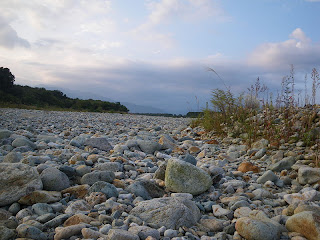There is undoubtedly a lot of skill in angling - the ability to cast well, for example. And it also requires a great deal of knowledge - you need to know where and when you're likely to find perch receptive to your worms. But this project is concerned with wisdom, and skills and knowledge do not, in themselves, make a person wise. So, to adapt a saying of Steve's, when we look at the practice of angling, we need to ask ourselves: 'Where's the wisdom?' How exactly do we see it as arising? I've touched on this before and I suggested that we might think about the matter in terms of both metaphors and metonyms. Skill at casting and knowledge of the quarry might be metaphors for the ability to live well - to respond to the world with insight and judgement. But, conversely, angling might also constitute a space where certain aspects of wisdom can actually be developed - a part of the world that can stand in some way for the whole.
I think what is on my mind is that many of the metonymic relationships are ones that are susceptible to being romanticised. Take, for example, the value of engaging with the natural world. I'd be the first to admit that external observers are at least as likely to valorise the encounter with nature as anglers themselves. Those who go fishing do, after all, have to deal with the cold and rain, with handling slimy creatures while pulling hooks from their mouths, with the fact that the English countryside is not always a pristine site of pastoral escape. But as someone who has a very ambivalent relationship with the rural landscape, having grown up in the midst of farmland myself, I sometimes find that the value of being 'in nature' is assumed in a way which, if I'm honest, I find a little hard to swallow. (Just as well, maybe, or we'd have to reach for the disgorger.)
Lest this sound cynical, let me stress that I completely accept that engaging with nature is a significant aspect of both life and fishing, but it's also susceptible to a rather uncritical reading, as - I suspect - are other aspects of the discourse of fishing-as-wisdom. So this is by way of a note-to-self. The devil's in the detail. (That's a bit of proverbial wisdom that I particularly love!) Nature is important but let's not generalise.
Living now not amidst agricultural land but in the centre of Sheffield, I often take a walk eastward along the River Don towards Attercliffe and pass by the anglers camped out at the water's edge. This is certainly not the Wye Valley. The river is lined with industrial buildings, some disused although others still working. At some points there are islands in the river, which - if this were a salmon stream - would be accumulations of pebbles but here have formed out of bricks and rubble. There is refuse on the banks and the whole area is thoroughly urban. But the practice of fishing allows for the discovery of something different in this space, where there is still flowing water, forests of underwater flora, and wild creatures that pass increasingly easily through the cityscape now the levels of pollution have come down. I'm reminded of the title of Derek Jarman's first volume of diaries - a phrase given to him by a friend. He tells the story early in the book and it is connected with the garden that he began to cultivate in the shadow of Dungeness Power Station after his diagnosis with HIV:
Lest this sound cynical, let me stress that I completely accept that engaging with nature is a significant aspect of both life and fishing, but it's also susceptible to a rather uncritical reading, as - I suspect - are other aspects of the discourse of fishing-as-wisdom. So this is by way of a note-to-self. The devil's in the detail. (That's a bit of proverbial wisdom that I particularly love!) Nature is important but let's not generalise.
Living now not amidst agricultural land but in the centre of Sheffield, I often take a walk eastward along the River Don towards Attercliffe and pass by the anglers camped out at the water's edge. This is certainly not the Wye Valley. The river is lined with industrial buildings, some disused although others still working. At some points there are islands in the river, which - if this were a salmon stream - would be accumulations of pebbles but here have formed out of bricks and rubble. There is refuse on the banks and the whole area is thoroughly urban. But the practice of fishing allows for the discovery of something different in this space, where there is still flowing water, forests of underwater flora, and wild creatures that pass increasingly easily through the cityscape now the levels of pollution have come down. I'm reminded of the title of Derek Jarman's first volume of diaries - a phrase given to him by a friend. He tells the story early in the book and it is connected with the garden that he began to cultivate in the shadow of Dungeness Power Station after his diagnosis with HIV:
Friday, 3 February, 1989
I was describing the garden to Maggi Hambling at a gallery opening. And said I intended to write a book about it.
She said: 'Oh, you've finally discovered nature, Derek.'
'I don't think it's quite like that', I said, thinking of Constable and Samuel Palmer's Kent.
'Ah, I understand completely. You've discovered modern nature.'
So here, to finish, is Constable's image of a fisherman at the mill pond and a photograph of Jarman's garden at Dungeness - nature in its romantic and modern modes.
John Constable, A Mill
John Constable, A Mill






